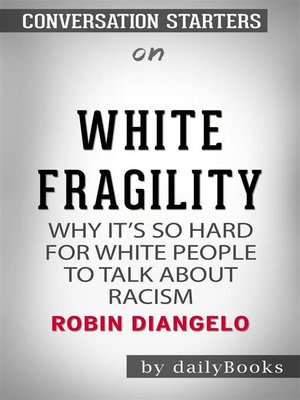White Fragility--Why It's So Hard for White People to Talk About Racism by Robin DiAngelo | Conversation Starters
ebook
By dailyBooks

Sign up to save your library
With an OverDrive account, you can save your favorite libraries for at-a-glance information about availability. Find out more about OverDrive accounts.
Find this title in Libby, the library reading app by OverDrive.



Search for a digital library with this title
Title found at these libraries:
| Library Name | Distance |
|---|---|
| Loading... |
White Fragility: Why It's So Hard for White People to Talk About Racism by Robin DiAngelo | Conversation Starters
The New York Times best-selling book White Fragility: Why It's So Hard for White People to Talk About Racism explores the reactions that white people have when their personal assumptions about race are challenged. DiAngelo observes that when their reactions are challenged, they maintain racial inequality.
DiAngelo is an anti-racist educator and she deftly illuminates in this book the phenomenon of white fragility. This book allows the readers to understand that racism is a practice that is not restricted to 'bad people.' She discusses the defensive moves that white people make when they are racially challenged. White fragility appears in a range of emotions like fear, anger, and guilt. It also appears to include silence and argumentation. These behaviors reinstate white racial equilibrium and prevent further meaningful cross-racial dialogue. DiAngelo explores white fragility, how it develops, how it gets triggered, how it protects racial inequality and how we can engage people better.
The New Yorker says that White Fragility is an "irrefutable exposure of racism in thought and action and its call for humility and vigilance."
A Brief Look Inside:
EVERY GOOD BOOK CONTAINS A WORLD FAR DEEPER
than the surface of its pages. The characters and their world come alive,
and the characters and its world still live on.
Conversation Starters is peppered with questions designed to
bring us beneath the surface of the page
and invite us into the world that lives on.
These questions can be used to..
Create Hours of Conversation:
• Foster a deeper understanding of the book
• Promote an atmosphere of discussion for groups
• Assist in the study of the book, either individually or corporately
• Explore unseen realms of the book as never seen before
The New York Times best-selling book White Fragility: Why It's So Hard for White People to Talk About Racism explores the reactions that white people have when their personal assumptions about race are challenged. DiAngelo observes that when their reactions are challenged, they maintain racial inequality.
DiAngelo is an anti-racist educator and she deftly illuminates in this book the phenomenon of white fragility. This book allows the readers to understand that racism is a practice that is not restricted to 'bad people.' She discusses the defensive moves that white people make when they are racially challenged. White fragility appears in a range of emotions like fear, anger, and guilt. It also appears to include silence and argumentation. These behaviors reinstate white racial equilibrium and prevent further meaningful cross-racial dialogue. DiAngelo explores white fragility, how it develops, how it gets triggered, how it protects racial inequality and how we can engage people better.
The New Yorker says that White Fragility is an "irrefutable exposure of racism in thought and action and its call for humility and vigilance."
A Brief Look Inside:
EVERY GOOD BOOK CONTAINS A WORLD FAR DEEPER
than the surface of its pages. The characters and their world come alive,
and the characters and its world still live on.
Conversation Starters is peppered with questions designed to
bring us beneath the surface of the page
and invite us into the world that lives on.
These questions can be used to..
Create Hours of Conversation:
• Foster a deeper understanding of the book
• Promote an atmosphere of discussion for groups
• Assist in the study of the book, either individually or corporately
• Explore unseen realms of the book as never seen before







